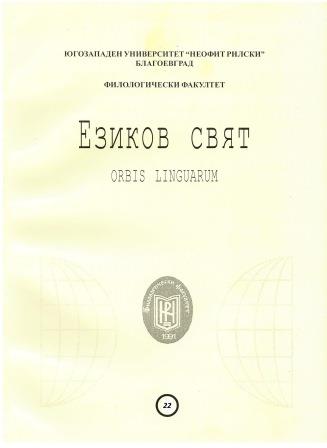ВЪЗМОЖНИТЕ И НЕВЪЗМОЖНИ ИСТОРИИ НА БЪЛГАРСКАТА ЛИТЕРАТУРА НА ХХ – ХХI ВЕК
THE POSSIBLE AND IMPOSSIBLE HISTORIES OF BULGARIAN LITERATURE IN THE 20TH – 21TH CENTURY
Author(s): Elka TraykovaSubject(s): Language and Literature Studies, Philology, Theory of Literature
Published by: ЮГОЗАПАДЕН УНИВЕРСИТЕТ »НЕОФИТ РИЛСКИ«
Keywords: 20th – 21th century; sociocultural and political context; chronological approach; literaryhistorical narrative; literary histories; methodological principles
Summary/Abstract: The article tries to present a possible literary-historical reconstruction of the histories of Bulgarian literature published in the 20th – 21th century. It traces how literary history is read and conceptualized through them in different sociocultural contexts. It marks the mechanisms through which literary history has built the canon of Bulgarian literature upholding its unique and unchangeable value. The study outlines the various ways in which sources from different periods sort and rearrange the authors of literature and their works chronologically or hierarchically in a complex historical megatext and how this megatext can reveal or forget, praise or deny some basic literary and aesthetics features. Attention is paid to the way they construct different models of national spiritual plot through their dialogue and polemics. This defines literary history not only as memory of the past and respect for the knowledge that is stored in documents and archive records, but also as individual authorial conceptions. In this sense, what is important in the creation of the literary-historical narrative is not only the aesthetic and sociopolitical context, but also the individuality of the author who creates both literature and history. Literary histories as a single author’s project or as a collective academic experience, presenting an attempt at a fundamental conceptualization of the processes in art or just fragmentary plots can be reminded of and read as objective or manipulated narratives about a national literature. They can be interpreted in a unique cultural context where many creative and existential plots meet, intersect, discuss and complement.
Journal: Езиков свят - Orbis Linguarum
- Issue Year: 22/2024
- Issue No: 1
- Page Range: 110-120
- Page Count: 11
- Language: Bulgarian

